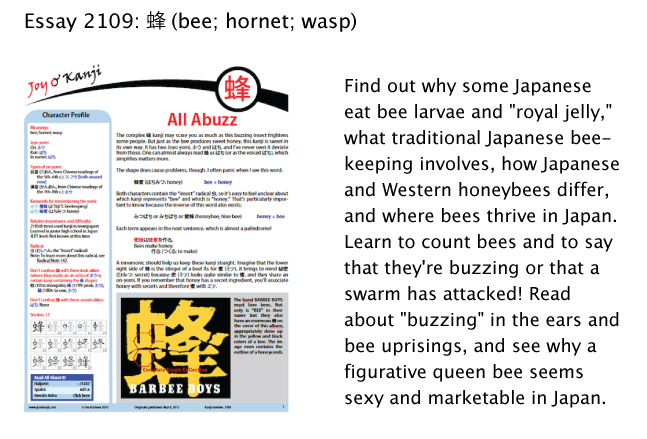The Spirit Withdraws
When I wrote about the following image in the newly released essay 2109 on Ķ£é (bee; hornet; wasp), I puzzled over two things:

First, should I translate Ķ£é (Ńü»ŃüĪ) as "bee," "hornet," or "wasp"? The kanji can represent all three insects.
Second, I found these words in the dictionary:
ķŁģŃüŗŃéīŃéŗ (Ńü▓ŃüŗŃéīŃéŗ: to be attracted to)
Õ«╣ń¢æĶĆģ (ŃéłŃüåŃüÄŃüŚŃéā: suspect)
But was the suspect attracted to the insects, or were they attracted to her? I've felt afraid of Ńü▓ŃüŗŃéīŃéŗ ever since I got it wrong—very wrong—in an exchange on Facebook with a new Japanese friend.
I tried to tell her that I was drawn to her because she's so observant. (Among other things, she's a great photographer.) To convey "drawn to," I consulted Breen's dictionary and found this listing:
Õ╝ĢŃüŗŃéīŃéŗ; µā╣ŃüŗŃéīŃéŗ; ķŁģŃüŗŃéīŃéŗ(iK) ŃĆÉŃü▓ŃüŗŃéīŃéŗŃĆæ (v1) to be charmed by; to be attracted to; to be taken with; to be drawn to
That looked perfect. I used Õ╝ĢŃüŗŃéīŃéŗ. Not so perfect, as it turns out. My correspondent told me this:
ŃüōŃü«ÕĀ┤ÕÉłŃü«Ńü▓ŃüŗŃéīŃéŗ Ńü»ŃĆüµā╣ŃüŗŃéīŃéŗŃü¦ŃüÖŃüŁŃĆéÕ╝ĢŃüŗŃéīŃéŗŃüĀŃü©ķĆåŃü«µäÅÕæ│Ńü½Ńü¬ŃéŖŃüŠŃüÖŃĆé
In this case, Ńü▓ŃüŗŃéīŃéŗ is µā╣ŃüŗŃéīŃéŗ, right? Õ╝ĢŃüŗŃéīŃéŗ has the opposite meaning.
ÕĀ┤ÕÉł (Ńü░ŃüéŃüä: case); ķĆå (ŃüÄŃéāŃüÅ: opposite); µäÅÕæ│ (ŃüäŃü┐: meaning)
I asked my proofreader what had gone awry, and he explained that Breen's listing was fine. However, the base of Õ╝ĢŃüŗŃéīŃéŗ is Õ╝ĢŃüÅ (Ńü▓ŃüÅ), which can mean “to retreat, back up.” Colloquially, Õ╝ĢŃüÅ can also mean “to become disgusted" or "to be turned off,” he said, adding this: "You may want to envision somebody disgusted who steps backward. Its passive voice Õ╝ĢŃüŗŃéīŃéŗ can therefore translate as 'to disgust somebody' or 'to turn somebody off'—hence, 'to repel.'" He characterized this usage as new slang that came from the entertainment world.
Apparently, I had informed my new friend that I repelled her! (It's possible that she actually understood what I meant but wanted to warn me that Õ╝ĢŃüŗŃéīŃéŗ could also mean something that I certainly didn't intend.)
I wondered about a connection between what my proofreader had said and the Õ╝ĢŃüæŃéŗ in the following phrase (which I saw long ago in a text by Kawabata, I think, and then jotted it down so I could explore it in the future):
µ░ŚŃüīÕ╝ĢŃüæŃéŗ (ŃüŹŃüīŃü▓ŃüæŃéŗ: the spirit withdraws, literally; can't bring myself to; feel a reluctance to)
Yes, said my proofreader, that Õ╝ĢŃüæŃéŗ is connected to “moving backward,” as well. But treating µ░ŚŃüīÕ╝ĢŃüæŃéŗ as one phrasal verb is much more convenient, he said.
With all that in mind, I returned to the task of translating the book title. Musing that insects such as mosquitoes are attracted to certain people more than to others, I figured the title was doing a playful reversal and had the human as the one attracted to insects. Completely unsure of myself, I came up with this:
ŃĆīĶ£éŃü½ķŁģŃüŗŃéīŃü¤Õ«╣ń¢æĶĆģŃĆŹ
The Suspect Attracted to Bees
To my surprise, my proofreader said I had it right! Well, mostly. But "bees" needed to be "hornets" because the story is about a religious terrorist in a new cult that uses hornets to attack people in Tokyo and environs! (Who would have guessed?!) Okay, then. My final offer:
ŃĆīĶ£éŃü½ķŁģŃüŗŃéīŃü¤Õ«╣ń¢æĶĆģŃĆŹ
The Suspect Attracted to Hornets
Speaking of attraction, I simultaneously feel an attraction and a repulsion right now, and it has nothing to do with insects. I adore any kanji containing the ultra-cute ķ¼╝ radical, so I'm drawn to ķŁģ, which has an array of tantalizing meanings: "to charm, bewitch, enchant, fascinate."
But I'm scarred by my first experience of using Ńü▓ŃüŗŃéīŃéŗ, and when I think about summoning the courage to try again, µ░ŚŃüīÕ╝ĢŃüæŃéŗ immediately comes to mind. My spirit withdraws in the face of fear! What a great expression!
Here's a sneak preview of the new essay 2109 on Ķ£é:

Have a great weekend. I dare you to take on challenges without having your spirit withdraw!

Comments